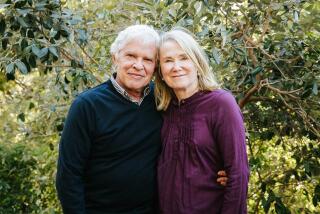Reform Jewish Group Chooses New Leader : Denomination: Rabbi Eric Yoffie will head Union of Hebrew Congregations despite a prominent opponent’s fear that he will stress social activism over religious concerns.
- Share via
Reform Jewish leaders have selected a self-described “baby boomer” to head North America’s largest Jewish denomination as it struggles to balance a commitment to liberal social action with growing calls for more traditional religious expression.
Meeting in Philadelphia last weekend, trustees of the Union of American Hebrew Congregations, the Reform movement’s congregational umbrella, voted to confirm its search committee’s selection of Rabbi Eric Yoffie, 47, of Westfield, N.J., as president.
Yoffie’s election came despite last-minute opposition by a longtime leader of the group, attorney David Belin, who said Yoffie has been so involved in social action efforts that it would be difficult for him to redirect the Reform movement toward such crucial issues as Jewish education, worship and outreach to intermarried and unaffiliated Jews.
The redirection is needed, Belin said, to “bring people into our synagogues when increasing numbers of young people do not believe in a personal God” and to stem the intermarriage rate, which is about 62% and growing among Reform Jews.
In recent months, the Reform commitment to social justice--spearheaded by its lobbying office in Washington, D.C.,-- has centered on opposition to the Republican Party’s “contract with America,” which Reform leaders say undermines the safety net beneath society’s poorest and most vulnerable members.
Yoffie said he does not foresee the Reform movement abandoning its liberal social agenda. “The social-action work we do is religious work,” he said. “It’s a response to the divine mandate. We embrace God by imitating God’s behavior, and it is God who embraces the weak and fallen.”
But neither, he said, does he intend to let social concerns overshadow the denomination’s religious agenda. “Our greatest challenge,” he said in an interview, “is to respond to the religious needs of Reform Jews.
“The dominant concerns of recent decades were communal--Israel, discrimination, acceptance into American society. Now, the urgency is personal concerns that speak to our hearts and minds. . . . The focus has shifted.”
Yoffie will succeed 69-year-old Rabbi Alexander Schindler, who is retiring after dominating the Reform movement for more than two decades.
Yoffie was elected by a unanimous vote of the organization’s 175 trustees. However, Belin--an honorary vice president of the group with no formal vote--has been an outspoken critic, and he is not alone among Reform leaders in calling for greater emphasis on religious education and practice and less on social-action lobbying.
He represents a growing trend that regards social action as a lesser priority in a time of skyrocketing Jewish assimilation and diminishing synagogue affiliation.
Even Schindler, despite his own championing of the Reform movement’s social justice agenda, has in recent years urged greater emphasis on prayer and other spiritual concerns. “Reform needs to stand not for religious minimalism, but for something that can satisfy the heart,” he said.
Yoffie said he agrees that Reform Judaism needs to “focus today on invigorating Jewish worship and study.” And he rejects the idea that he is not in alignment with the call for new priorities.
He noted that he personally follows such traditional Jewish practices as eating only kosher foods in his home, an observance that had been rejected by Reform’s 19th-Century German-Jewish founders in their quest to modernize an ancient religion.
“The Reform movement is going from an immigrant-led generation (Schindler is German-born) to an American-born baby boomer who has a different set of sensitivities,” Yoffie said. “Their motivation was to be accepted. They achieved that.
“Our essential task now is a religious task to . . . recreate communities that have [Jewish values and worship] at their center.”
Yoffie said he intends to push Reform efforts to gain official acceptance in Israel, where Orthodox rabbis hostile to the Reform movement control that nation’s religious life.
More to Read
Sign up for Essential California
The most important California stories and recommendations in your inbox every morning.
You may occasionally receive promotional content from the Los Angeles Times.









